BULAW5916: Taxation Law Assignment - Shared Economy Compliance
VerifiedAdded on 2023/01/03
|10
|2788
|90
Report
AI Summary
This report examines the taxation of the shared economy, focusing on the challenges of ensuring compliance with Australian income tax laws for providers like Uber and Airbnb. It explores the current reporting regimes and the limitations of existing data collection methods by the ATO. The report discusses the need for improved transparency and the difficulties in identifying and addressing underreporting of income by gig economy workers. It analyzes the ATO's efforts to enhance compliance through data matching activities and the potential for new reporting regimes. The report also recommends ways to improve tax obligations, including the adoption of tax installment regimes and mandatory reporting by platform operators. It further discusses the role of financial institutions in providing data to the ATO and the importance of consistent data formatting. The report concludes by emphasizing the benefits of the sharing economy but stresses the need for appropriate tax codes to ensure a reliable basis of public income, while highlighting the unique compliance opportunities presented by its digital nature.
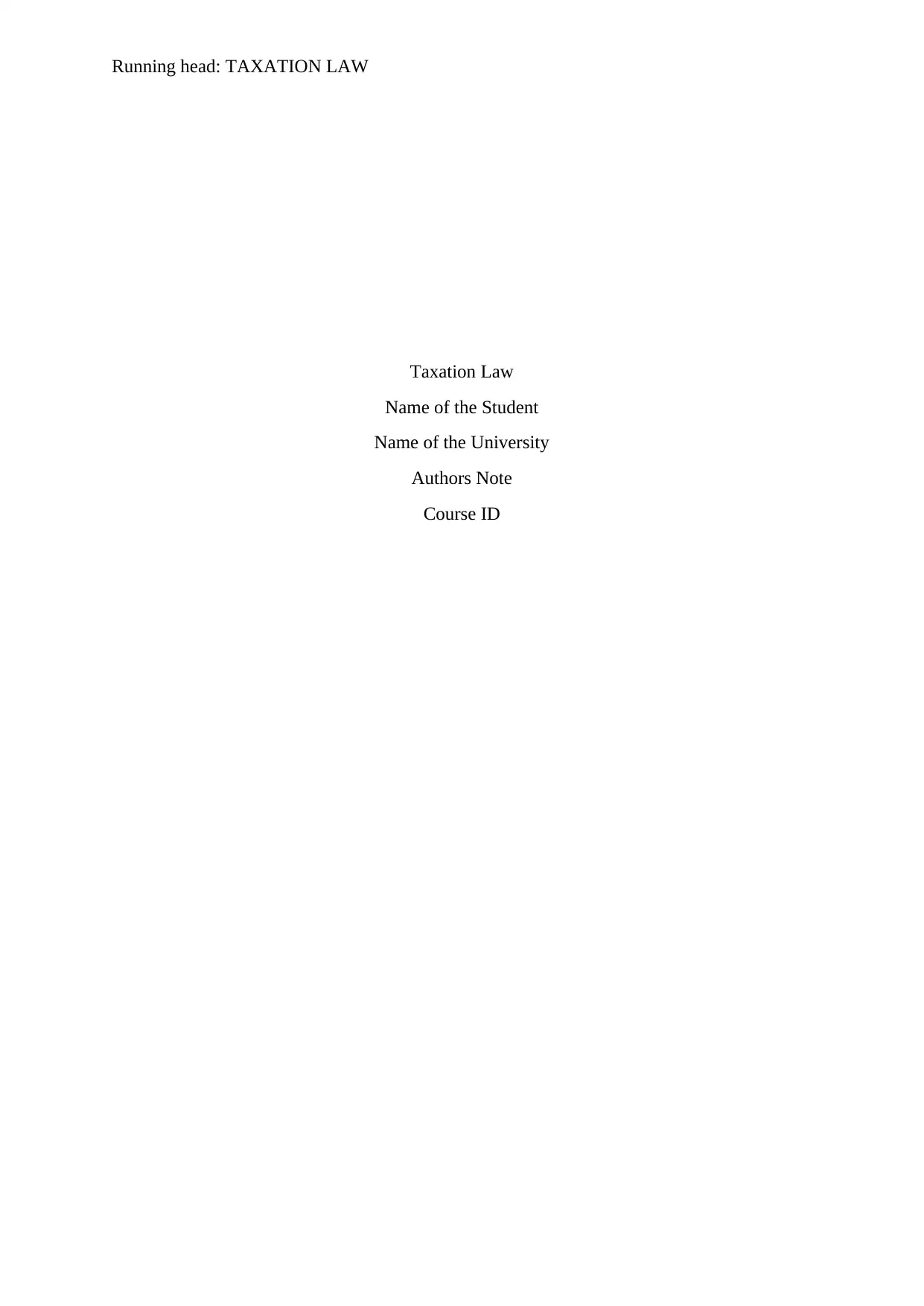
Running head: TAXATION LAW
Taxation Law
Name of the Student
Name of the University
Authors Note
Course ID
Taxation Law
Name of the Student
Name of the University
Authors Note
Course ID
Paraphrase This Document
Need a fresh take? Get an instant paraphrase of this document with our AI Paraphraser
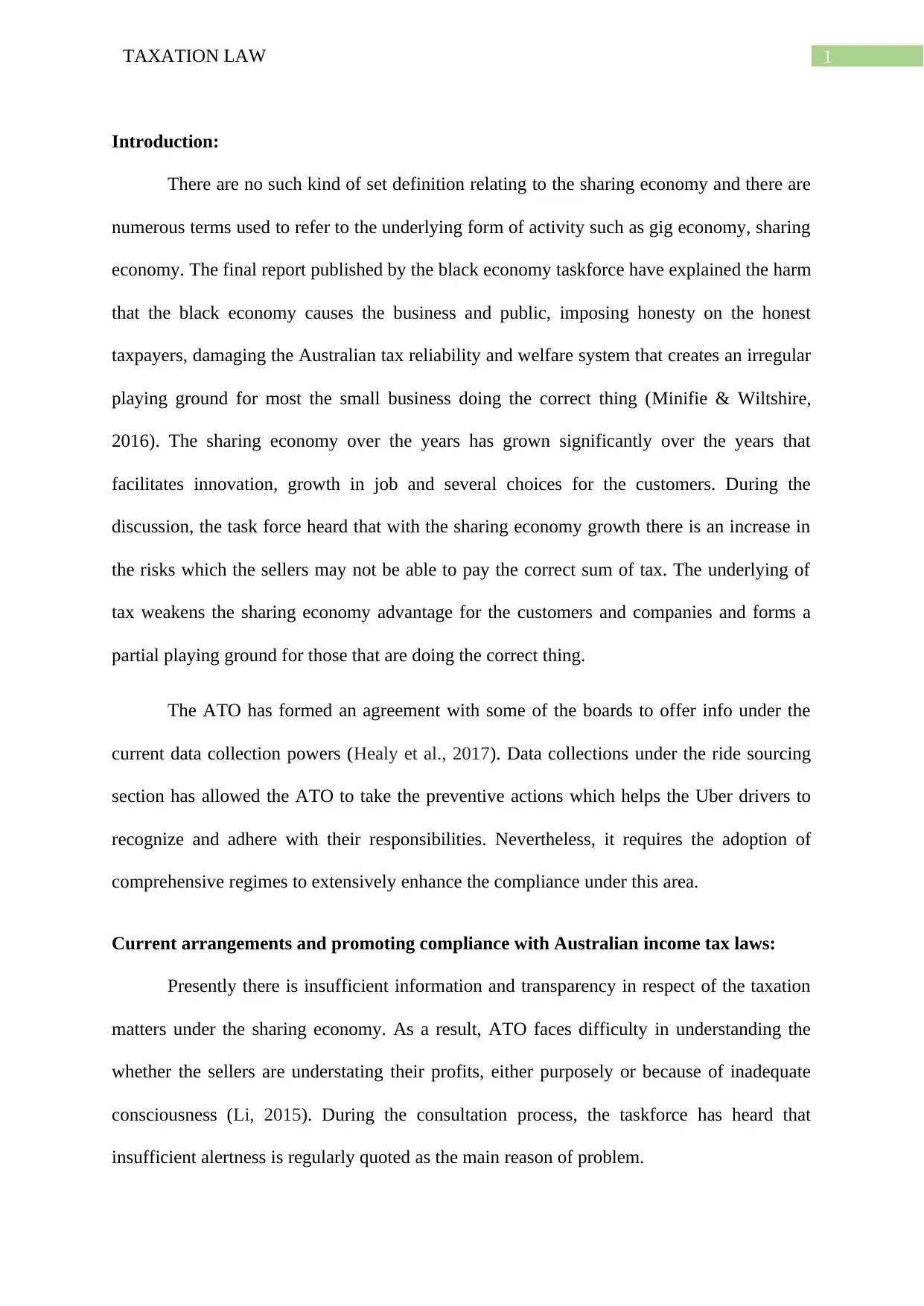
1TAXATION LAW
Introduction:
There are no such kind of set definition relating to the sharing economy and there are
numerous terms used to refer to the underlying form of activity such as gig economy, sharing
economy. The final report published by the black economy taskforce have explained the harm
that the black economy causes the business and public, imposing honesty on the honest
taxpayers, damaging the Australian tax reliability and welfare system that creates an irregular
playing ground for most the small business doing the correct thing (Minifie & Wiltshire,
2016). The sharing economy over the years has grown significantly over the years that
facilitates innovation, growth in job and several choices for the customers. During the
discussion, the task force heard that with the sharing economy growth there is an increase in
the risks which the sellers may not be able to pay the correct sum of tax. The underlying of
tax weakens the sharing economy advantage for the customers and companies and forms a
partial playing ground for those that are doing the correct thing.
The ATO has formed an agreement with some of the boards to offer info under the
current data collection powers (Healy et al., 2017). Data collections under the ride sourcing
section has allowed the ATO to take the preventive actions which helps the Uber drivers to
recognize and adhere with their responsibilities. Nevertheless, it requires the adoption of
comprehensive regimes to extensively enhance the compliance under this area.
Current arrangements and promoting compliance with Australian income tax laws:
Presently there is insufficient information and transparency in respect of the taxation
matters under the sharing economy. As a result, ATO faces difficulty in understanding the
whether the sellers are understating their profits, either purposely or because of inadequate
consciousness (Li, 2015). During the consultation process, the taskforce has heard that
insufficient alertness is regularly quoted as the main reason of problem.
Introduction:
There are no such kind of set definition relating to the sharing economy and there are
numerous terms used to refer to the underlying form of activity such as gig economy, sharing
economy. The final report published by the black economy taskforce have explained the harm
that the black economy causes the business and public, imposing honesty on the honest
taxpayers, damaging the Australian tax reliability and welfare system that creates an irregular
playing ground for most the small business doing the correct thing (Minifie & Wiltshire,
2016). The sharing economy over the years has grown significantly over the years that
facilitates innovation, growth in job and several choices for the customers. During the
discussion, the task force heard that with the sharing economy growth there is an increase in
the risks which the sellers may not be able to pay the correct sum of tax. The underlying of
tax weakens the sharing economy advantage for the customers and companies and forms a
partial playing ground for those that are doing the correct thing.
The ATO has formed an agreement with some of the boards to offer info under the
current data collection powers (Healy et al., 2017). Data collections under the ride sourcing
section has allowed the ATO to take the preventive actions which helps the Uber drivers to
recognize and adhere with their responsibilities. Nevertheless, it requires the adoption of
comprehensive regimes to extensively enhance the compliance under this area.
Current arrangements and promoting compliance with Australian income tax laws:
Presently there is insufficient information and transparency in respect of the taxation
matters under the sharing economy. As a result, ATO faces difficulty in understanding the
whether the sellers are understating their profits, either purposely or because of inadequate
consciousness (Li, 2015). During the consultation process, the taskforce has heard that
insufficient alertness is regularly quoted as the main reason of problem.
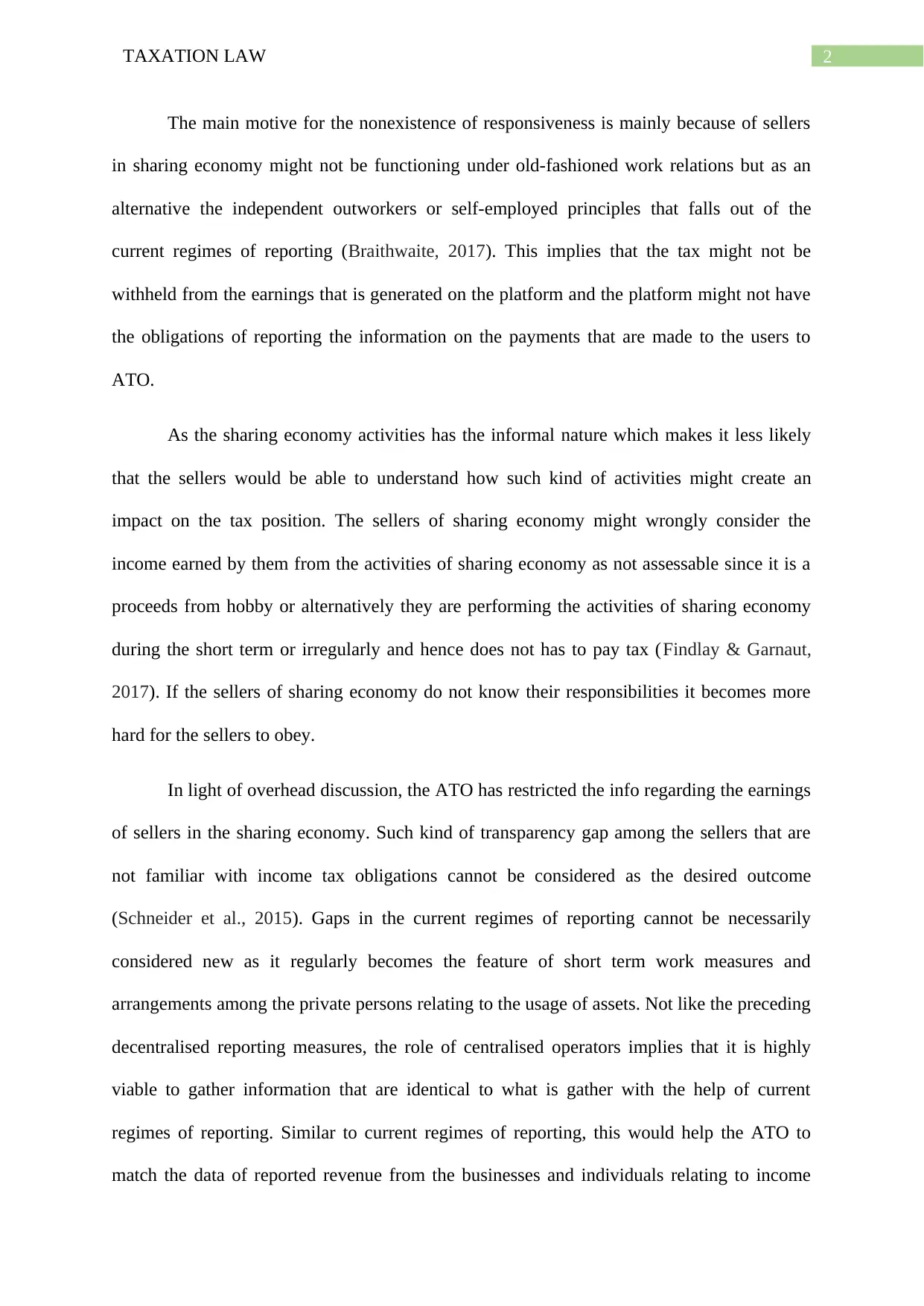
2TAXATION LAW
The main motive for the nonexistence of responsiveness is mainly because of sellers
in sharing economy might not be functioning under old-fashioned work relations but as an
alternative the independent outworkers or self-employed principles that falls out of the
current regimes of reporting (Braithwaite, 2017). This implies that the tax might not be
withheld from the earnings that is generated on the platform and the platform might not have
the obligations of reporting the information on the payments that are made to the users to
ATO.
As the sharing economy activities has the informal nature which makes it less likely
that the sellers would be able to understand how such kind of activities might create an
impact on the tax position. The sellers of sharing economy might wrongly consider the
income earned by them from the activities of sharing economy as not assessable since it is a
proceeds from hobby or alternatively they are performing the activities of sharing economy
during the short term or irregularly and hence does not has to pay tax (Findlay & Garnaut,
2017). If the sellers of sharing economy do not know their responsibilities it becomes more
hard for the sellers to obey.
In light of overhead discussion, the ATO has restricted the info regarding the earnings
of sellers in the sharing economy. Such kind of transparency gap among the sellers that are
not familiar with income tax obligations cannot be considered as the desired outcome
(Schneider et al., 2015). Gaps in the current regimes of reporting cannot be necessarily
considered new as it regularly becomes the feature of short term work measures and
arrangements among the private persons relating to the usage of assets. Not like the preceding
decentralised reporting measures, the role of centralised operators implies that it is highly
viable to gather information that are identical to what is gather with the help of current
regimes of reporting. Similar to current regimes of reporting, this would help the ATO to
match the data of reported revenue from the businesses and individuals relating to income
The main motive for the nonexistence of responsiveness is mainly because of sellers
in sharing economy might not be functioning under old-fashioned work relations but as an
alternative the independent outworkers or self-employed principles that falls out of the
current regimes of reporting (Braithwaite, 2017). This implies that the tax might not be
withheld from the earnings that is generated on the platform and the platform might not have
the obligations of reporting the information on the payments that are made to the users to
ATO.
As the sharing economy activities has the informal nature which makes it less likely
that the sellers would be able to understand how such kind of activities might create an
impact on the tax position. The sellers of sharing economy might wrongly consider the
income earned by them from the activities of sharing economy as not assessable since it is a
proceeds from hobby or alternatively they are performing the activities of sharing economy
during the short term or irregularly and hence does not has to pay tax (Findlay & Garnaut,
2017). If the sellers of sharing economy do not know their responsibilities it becomes more
hard for the sellers to obey.
In light of overhead discussion, the ATO has restricted the info regarding the earnings
of sellers in the sharing economy. Such kind of transparency gap among the sellers that are
not familiar with income tax obligations cannot be considered as the desired outcome
(Schneider et al., 2015). Gaps in the current regimes of reporting cannot be necessarily
considered new as it regularly becomes the feature of short term work measures and
arrangements among the private persons relating to the usage of assets. Not like the preceding
decentralised reporting measures, the role of centralised operators implies that it is highly
viable to gather information that are identical to what is gather with the help of current
regimes of reporting. Similar to current regimes of reporting, this would help the ATO to
match the data of reported revenue from the businesses and individuals relating to income
⊘ This is a preview!⊘
Do you want full access?
Subscribe today to unlock all pages.

Trusted by 1+ million students worldwide
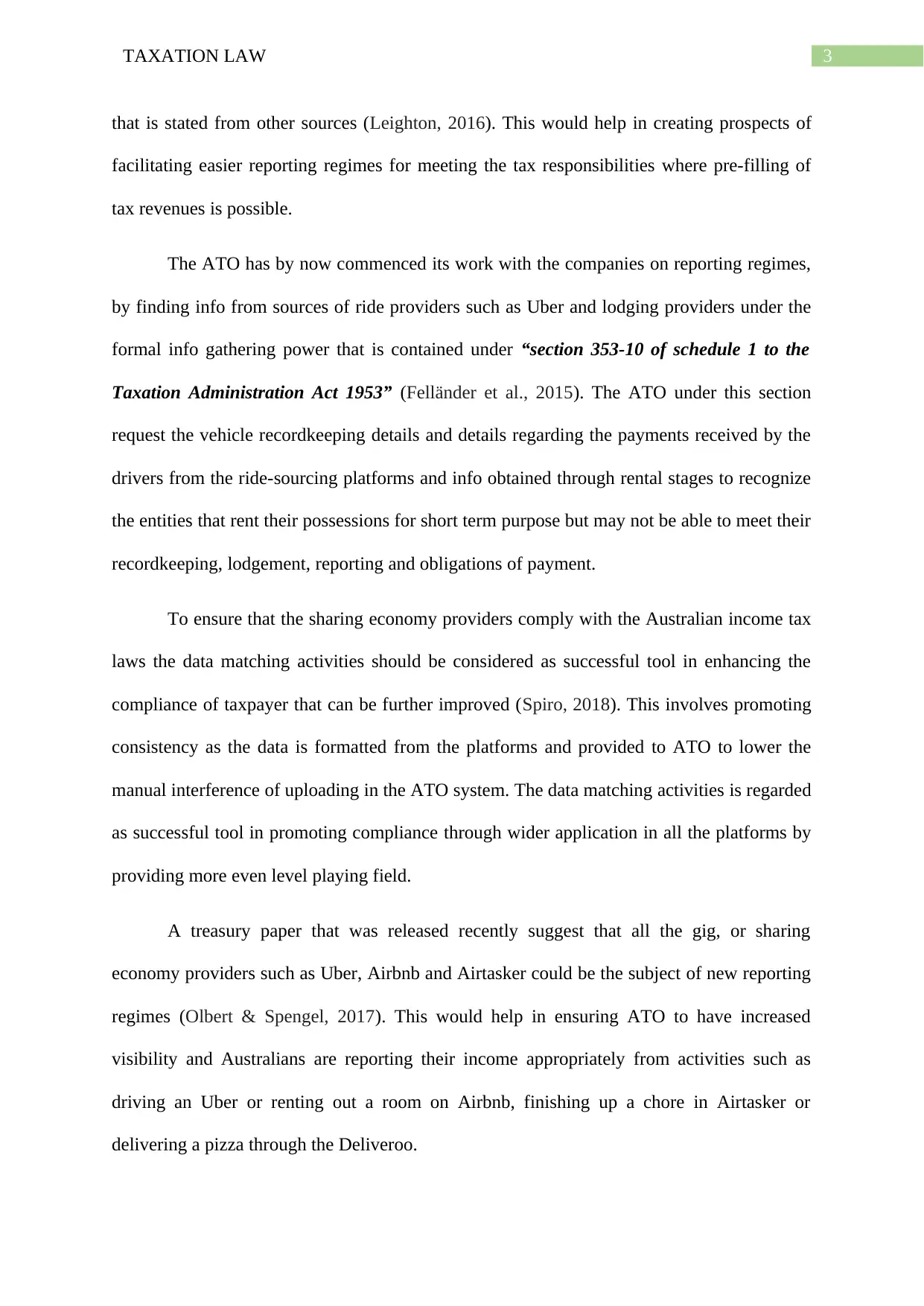
3TAXATION LAW
that is stated from other sources (Leighton, 2016). This would help in creating prospects of
facilitating easier reporting regimes for meeting the tax responsibilities where pre-filling of
tax revenues is possible.
The ATO has by now commenced its work with the companies on reporting regimes,
by finding info from sources of ride providers such as Uber and lodging providers under the
formal info gathering power that is contained under “section 353-10 of schedule 1 to the
Taxation Administration Act 1953” (Felländer et al., 2015). The ATO under this section
request the vehicle recordkeeping details and details regarding the payments received by the
drivers from the ride-sourcing platforms and info obtained through rental stages to recognize
the entities that rent their possessions for short term purpose but may not be able to meet their
recordkeeping, lodgement, reporting and obligations of payment.
To ensure that the sharing economy providers comply with the Australian income tax
laws the data matching activities should be considered as successful tool in enhancing the
compliance of taxpayer that can be further improved (Spiro, 2018). This involves promoting
consistency as the data is formatted from the platforms and provided to ATO to lower the
manual interference of uploading in the ATO system. The data matching activities is regarded
as successful tool in promoting compliance through wider application in all the platforms by
providing more even level playing field.
A treasury paper that was released recently suggest that all the gig, or sharing
economy providers such as Uber, Airbnb and Airtasker could be the subject of new reporting
regimes (Olbert & Spengel, 2017). This would help in ensuring ATO to have increased
visibility and Australians are reporting their income appropriately from activities such as
driving an Uber or renting out a room on Airbnb, finishing up a chore in Airtasker or
delivering a pizza through the Deliveroo.
that is stated from other sources (Leighton, 2016). This would help in creating prospects of
facilitating easier reporting regimes for meeting the tax responsibilities where pre-filling of
tax revenues is possible.
The ATO has by now commenced its work with the companies on reporting regimes,
by finding info from sources of ride providers such as Uber and lodging providers under the
formal info gathering power that is contained under “section 353-10 of schedule 1 to the
Taxation Administration Act 1953” (Felländer et al., 2015). The ATO under this section
request the vehicle recordkeeping details and details regarding the payments received by the
drivers from the ride-sourcing platforms and info obtained through rental stages to recognize
the entities that rent their possessions for short term purpose but may not be able to meet their
recordkeeping, lodgement, reporting and obligations of payment.
To ensure that the sharing economy providers comply with the Australian income tax
laws the data matching activities should be considered as successful tool in enhancing the
compliance of taxpayer that can be further improved (Spiro, 2018). This involves promoting
consistency as the data is formatted from the platforms and provided to ATO to lower the
manual interference of uploading in the ATO system. The data matching activities is regarded
as successful tool in promoting compliance through wider application in all the platforms by
providing more even level playing field.
A treasury paper that was released recently suggest that all the gig, or sharing
economy providers such as Uber, Airbnb and Airtasker could be the subject of new reporting
regimes (Olbert & Spengel, 2017). This would help in ensuring ATO to have increased
visibility and Australians are reporting their income appropriately from activities such as
driving an Uber or renting out a room on Airbnb, finishing up a chore in Airtasker or
delivering a pizza through the Deliveroo.
Paraphrase This Document
Need a fresh take? Get an instant paraphrase of this document with our AI Paraphraser
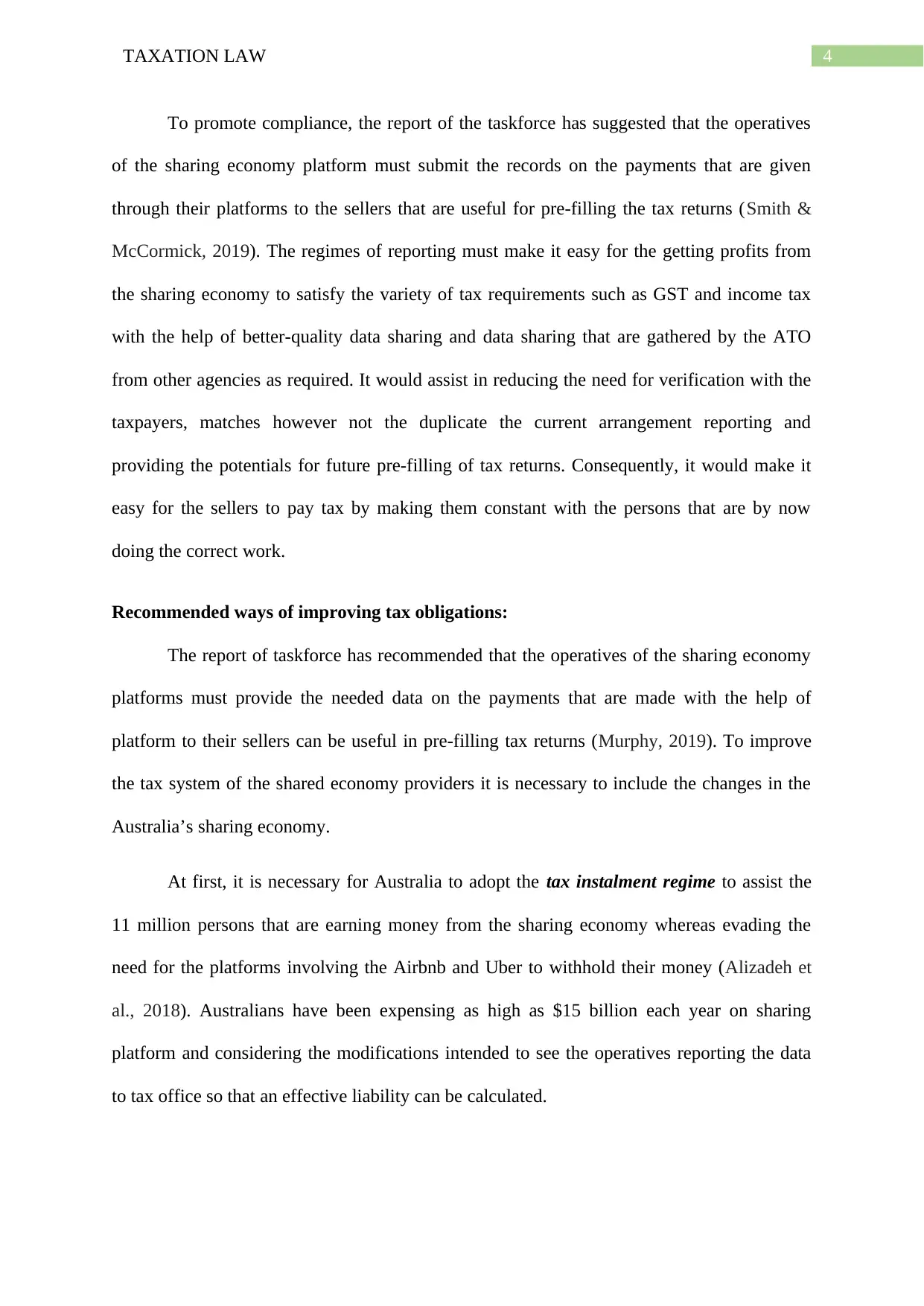
4TAXATION LAW
To promote compliance, the report of the taskforce has suggested that the operatives
of the sharing economy platform must submit the records on the payments that are given
through their platforms to the sellers that are useful for pre-filling the tax returns (Smith &
McCormick, 2019). The regimes of reporting must make it easy for the getting profits from
the sharing economy to satisfy the variety of tax requirements such as GST and income tax
with the help of better-quality data sharing and data sharing that are gathered by the ATO
from other agencies as required. It would assist in reducing the need for verification with the
taxpayers, matches however not the duplicate the current arrangement reporting and
providing the potentials for future pre-filling of tax returns. Consequently, it would make it
easy for the sellers to pay tax by making them constant with the persons that are by now
doing the correct work.
Recommended ways of improving tax obligations:
The report of taskforce has recommended that the operatives of the sharing economy
platforms must provide the needed data on the payments that are made with the help of
platform to their sellers can be useful in pre-filling tax returns (Murphy, 2019). To improve
the tax system of the shared economy providers it is necessary to include the changes in the
Australia’s sharing economy.
At first, it is necessary for Australia to adopt the tax instalment regime to assist the
11 million persons that are earning money from the sharing economy whereas evading the
need for the platforms involving the Airbnb and Uber to withhold their money (Alizadeh et
al., 2018). Australians have been expensing as high as $15 billion each year on sharing
platform and considering the modifications intended to see the operatives reporting the data
to tax office so that an effective liability can be calculated.
To promote compliance, the report of the taskforce has suggested that the operatives
of the sharing economy platform must submit the records on the payments that are given
through their platforms to the sellers that are useful for pre-filling the tax returns (Smith &
McCormick, 2019). The regimes of reporting must make it easy for the getting profits from
the sharing economy to satisfy the variety of tax requirements such as GST and income tax
with the help of better-quality data sharing and data sharing that are gathered by the ATO
from other agencies as required. It would assist in reducing the need for verification with the
taxpayers, matches however not the duplicate the current arrangement reporting and
providing the potentials for future pre-filling of tax returns. Consequently, it would make it
easy for the sellers to pay tax by making them constant with the persons that are by now
doing the correct work.
Recommended ways of improving tax obligations:
The report of taskforce has recommended that the operatives of the sharing economy
platforms must provide the needed data on the payments that are made with the help of
platform to their sellers can be useful in pre-filling tax returns (Murphy, 2019). To improve
the tax system of the shared economy providers it is necessary to include the changes in the
Australia’s sharing economy.
At first, it is necessary for Australia to adopt the tax instalment regime to assist the
11 million persons that are earning money from the sharing economy whereas evading the
need for the platforms involving the Airbnb and Uber to withhold their money (Alizadeh et
al., 2018). Australians have been expensing as high as $15 billion each year on sharing
platform and considering the modifications intended to see the operatives reporting the data
to tax office so that an effective liability can be calculated.
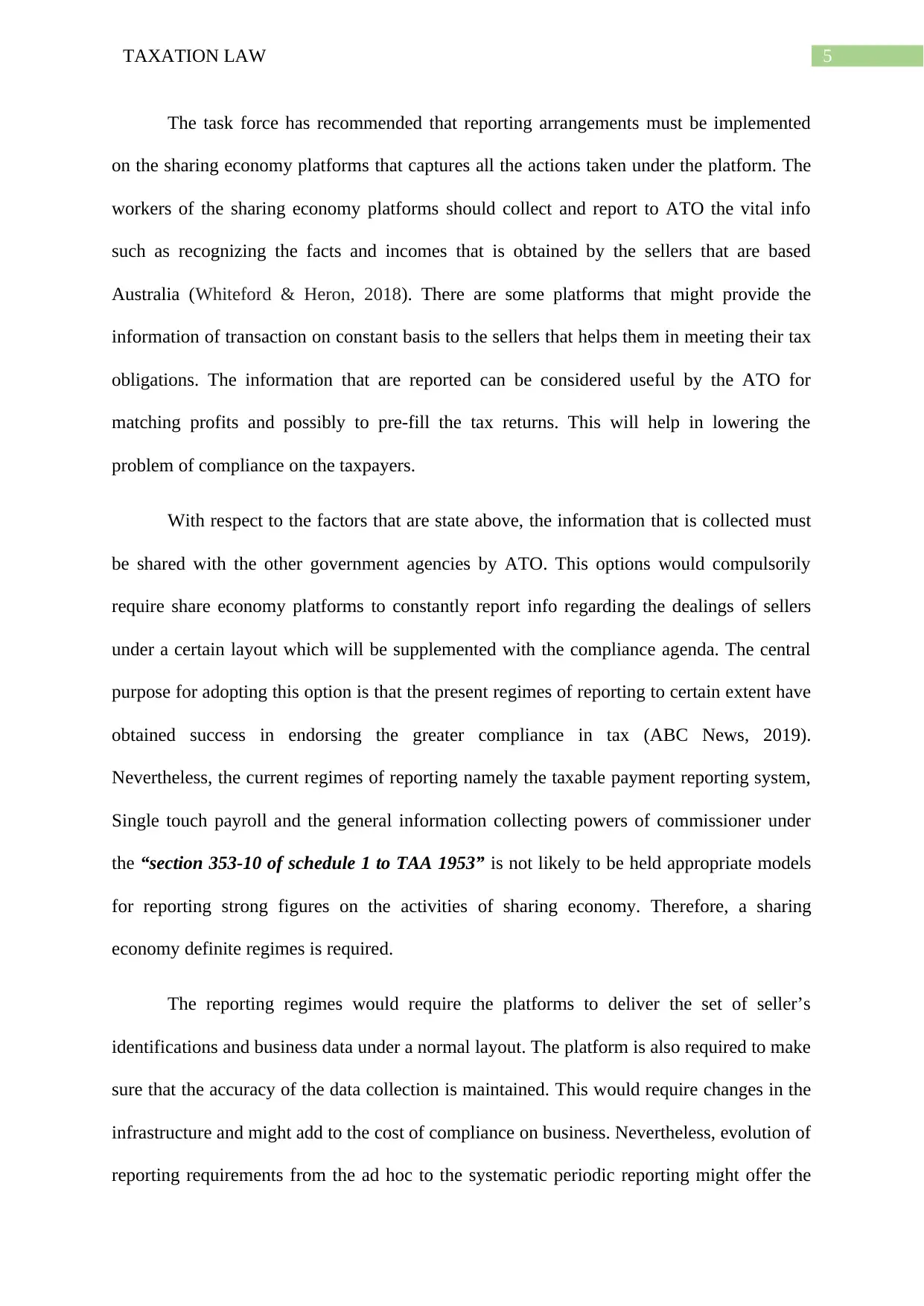
5TAXATION LAW
The task force has recommended that reporting arrangements must be implemented
on the sharing economy platforms that captures all the actions taken under the platform. The
workers of the sharing economy platforms should collect and report to ATO the vital info
such as recognizing the facts and incomes that is obtained by the sellers that are based
Australia (Whiteford & Heron, 2018). There are some platforms that might provide the
information of transaction on constant basis to the sellers that helps them in meeting their tax
obligations. The information that are reported can be considered useful by the ATO for
matching profits and possibly to pre-fill the tax returns. This will help in lowering the
problem of compliance on the taxpayers.
With respect to the factors that are state above, the information that is collected must
be shared with the other government agencies by ATO. This options would compulsorily
require share economy platforms to constantly report info regarding the dealings of sellers
under a certain layout which will be supplemented with the compliance agenda. The central
purpose for adopting this option is that the present regimes of reporting to certain extent have
obtained success in endorsing the greater compliance in tax (ABC News, 2019).
Nevertheless, the current regimes of reporting namely the taxable payment reporting system,
Single touch payroll and the general information collecting powers of commissioner under
the “section 353-10 of schedule 1 to TAA 1953” is not likely to be held appropriate models
for reporting strong figures on the activities of sharing economy. Therefore, a sharing
economy definite regimes is required.
The reporting regimes would require the platforms to deliver the set of seller’s
identifications and business data under a normal layout. The platform is also required to make
sure that the accuracy of the data collection is maintained. This would require changes in the
infrastructure and might add to the cost of compliance on business. Nevertheless, evolution of
reporting requirements from the ad hoc to the systematic periodic reporting might offer the
The task force has recommended that reporting arrangements must be implemented
on the sharing economy platforms that captures all the actions taken under the platform. The
workers of the sharing economy platforms should collect and report to ATO the vital info
such as recognizing the facts and incomes that is obtained by the sellers that are based
Australia (Whiteford & Heron, 2018). There are some platforms that might provide the
information of transaction on constant basis to the sellers that helps them in meeting their tax
obligations. The information that are reported can be considered useful by the ATO for
matching profits and possibly to pre-fill the tax returns. This will help in lowering the
problem of compliance on the taxpayers.
With respect to the factors that are state above, the information that is collected must
be shared with the other government agencies by ATO. This options would compulsorily
require share economy platforms to constantly report info regarding the dealings of sellers
under a certain layout which will be supplemented with the compliance agenda. The central
purpose for adopting this option is that the present regimes of reporting to certain extent have
obtained success in endorsing the greater compliance in tax (ABC News, 2019).
Nevertheless, the current regimes of reporting namely the taxable payment reporting system,
Single touch payroll and the general information collecting powers of commissioner under
the “section 353-10 of schedule 1 to TAA 1953” is not likely to be held appropriate models
for reporting strong figures on the activities of sharing economy. Therefore, a sharing
economy definite regimes is required.
The reporting regimes would require the platforms to deliver the set of seller’s
identifications and business data under a normal layout. The platform is also required to make
sure that the accuracy of the data collection is maintained. This would require changes in the
infrastructure and might add to the cost of compliance on business. Nevertheless, evolution of
reporting requirements from the ad hoc to the systematic periodic reporting might offer the
⊘ This is a preview!⊘
Do you want full access?
Subscribe today to unlock all pages.

Trusted by 1+ million students worldwide
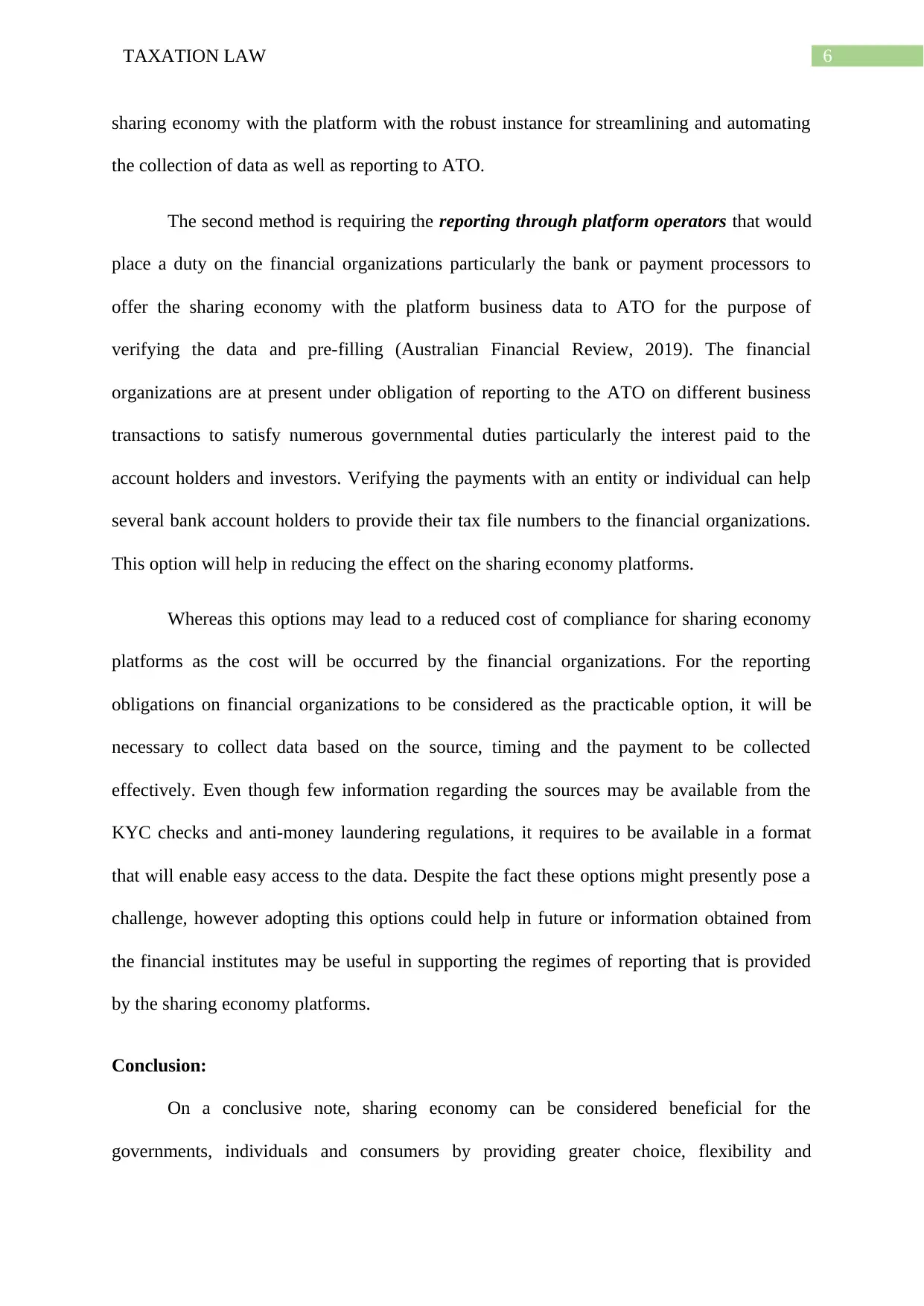
6TAXATION LAW
sharing economy with the platform with the robust instance for streamlining and automating
the collection of data as well as reporting to ATO.
The second method is requiring the reporting through platform operators that would
place a duty on the financial organizations particularly the bank or payment processors to
offer the sharing economy with the platform business data to ATO for the purpose of
verifying the data and pre-filling (Australian Financial Review, 2019). The financial
organizations are at present under obligation of reporting to the ATO on different business
transactions to satisfy numerous governmental duties particularly the interest paid to the
account holders and investors. Verifying the payments with an entity or individual can help
several bank account holders to provide their tax file numbers to the financial organizations.
This option will help in reducing the effect on the sharing economy platforms.
Whereas this options may lead to a reduced cost of compliance for sharing economy
platforms as the cost will be occurred by the financial organizations. For the reporting
obligations on financial organizations to be considered as the practicable option, it will be
necessary to collect data based on the source, timing and the payment to be collected
effectively. Even though few information regarding the sources may be available from the
KYC checks and anti-money laundering regulations, it requires to be available in a format
that will enable easy access to the data. Despite the fact these options might presently pose a
challenge, however adopting this options could help in future or information obtained from
the financial institutes may be useful in supporting the regimes of reporting that is provided
by the sharing economy platforms.
Conclusion:
On a conclusive note, sharing economy can be considered beneficial for the
governments, individuals and consumers by providing greater choice, flexibility and
sharing economy with the platform with the robust instance for streamlining and automating
the collection of data as well as reporting to ATO.
The second method is requiring the reporting through platform operators that would
place a duty on the financial organizations particularly the bank or payment processors to
offer the sharing economy with the platform business data to ATO for the purpose of
verifying the data and pre-filling (Australian Financial Review, 2019). The financial
organizations are at present under obligation of reporting to the ATO on different business
transactions to satisfy numerous governmental duties particularly the interest paid to the
account holders and investors. Verifying the payments with an entity or individual can help
several bank account holders to provide their tax file numbers to the financial organizations.
This option will help in reducing the effect on the sharing economy platforms.
Whereas this options may lead to a reduced cost of compliance for sharing economy
platforms as the cost will be occurred by the financial organizations. For the reporting
obligations on financial organizations to be considered as the practicable option, it will be
necessary to collect data based on the source, timing and the payment to be collected
effectively. Even though few information regarding the sources may be available from the
KYC checks and anti-money laundering regulations, it requires to be available in a format
that will enable easy access to the data. Despite the fact these options might presently pose a
challenge, however adopting this options could help in future or information obtained from
the financial institutes may be useful in supporting the regimes of reporting that is provided
by the sharing economy platforms.
Conclusion:
On a conclusive note, sharing economy can be considered beneficial for the
governments, individuals and consumers by providing greater choice, flexibility and
Paraphrase This Document
Need a fresh take? Get an instant paraphrase of this document with our AI Paraphraser
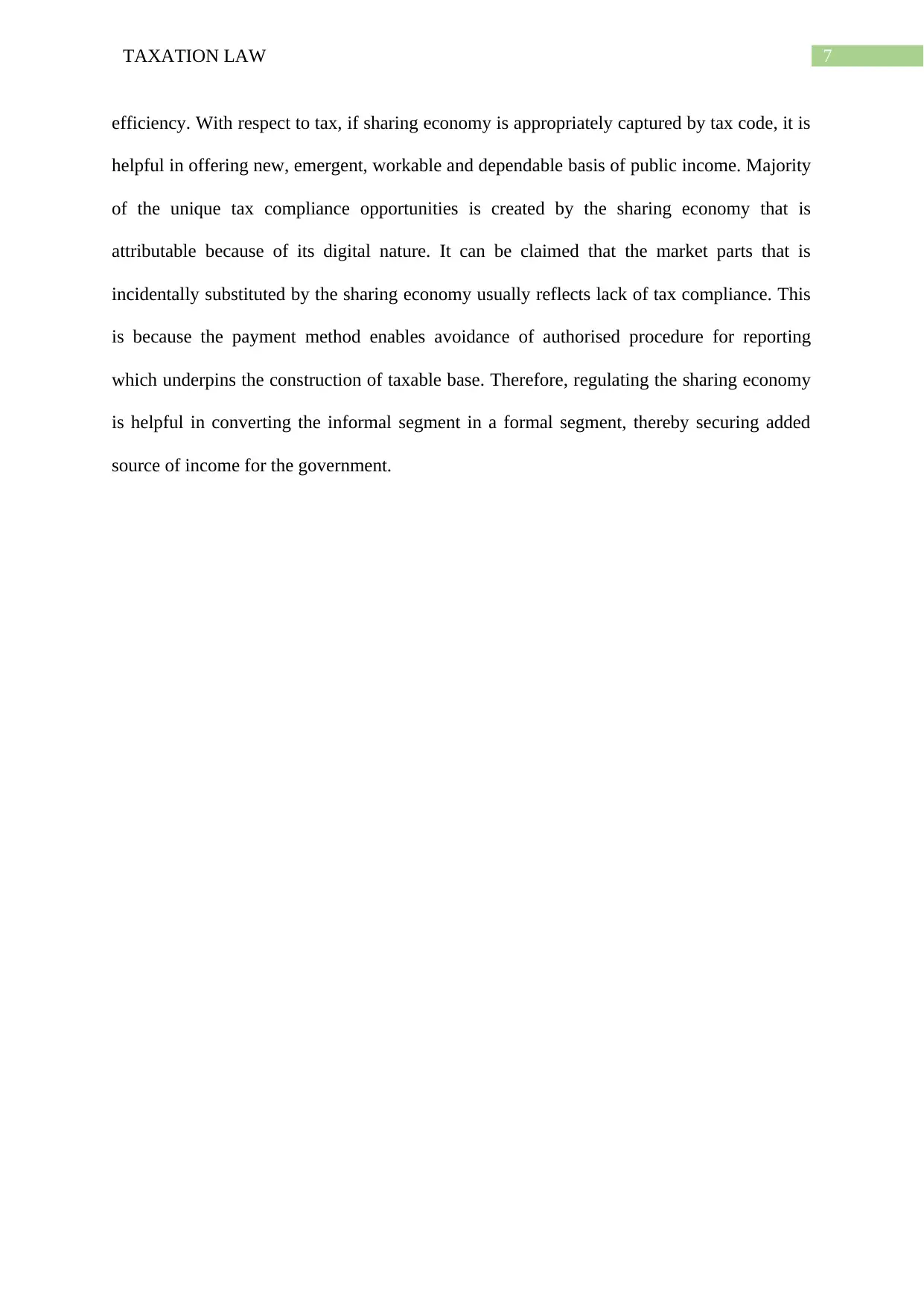
7TAXATION LAW
efficiency. With respect to tax, if sharing economy is appropriately captured by tax code, it is
helpful in offering new, emergent, workable and dependable basis of public income. Majority
of the unique tax compliance opportunities is created by the sharing economy that is
attributable because of its digital nature. It can be claimed that the market parts that is
incidentally substituted by the sharing economy usually reflects lack of tax compliance. This
is because the payment method enables avoidance of authorised procedure for reporting
which underpins the construction of taxable base. Therefore, regulating the sharing economy
is helpful in converting the informal segment in a formal segment, thereby securing added
source of income for the government.
efficiency. With respect to tax, if sharing economy is appropriately captured by tax code, it is
helpful in offering new, emergent, workable and dependable basis of public income. Majority
of the unique tax compliance opportunities is created by the sharing economy that is
attributable because of its digital nature. It can be claimed that the market parts that is
incidentally substituted by the sharing economy usually reflects lack of tax compliance. This
is because the payment method enables avoidance of authorised procedure for reporting
which underpins the construction of taxable base. Therefore, regulating the sharing economy
is helpful in converting the informal segment in a formal segment, thereby securing added
source of income for the government.
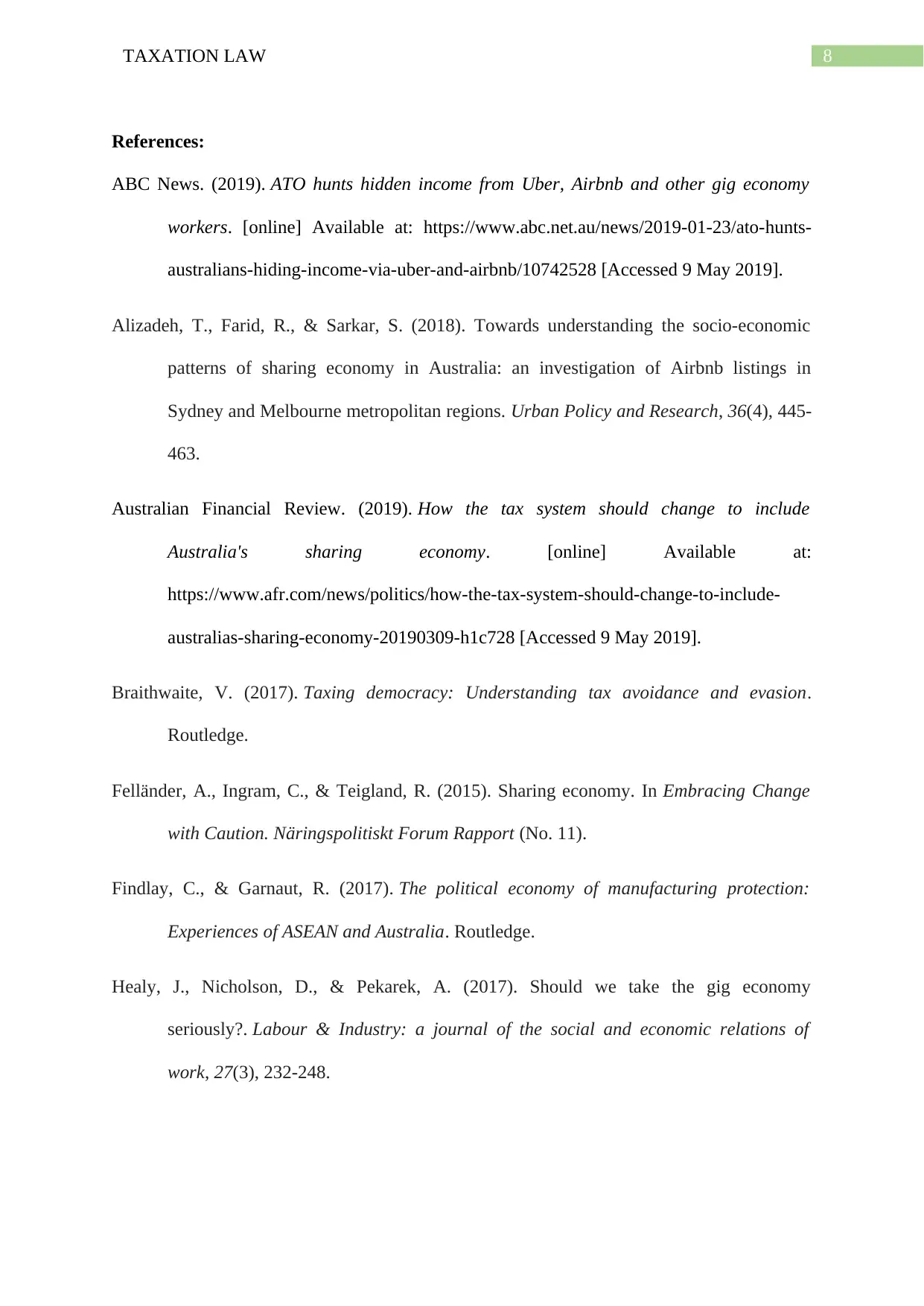
8TAXATION LAW
References:
ABC News. (2019). ATO hunts hidden income from Uber, Airbnb and other gig economy
workers. [online] Available at: https://www.abc.net.au/news/2019-01-23/ato-hunts-
australians-hiding-income-via-uber-and-airbnb/10742528 [Accessed 9 May 2019].
Alizadeh, T., Farid, R., & Sarkar, S. (2018). Towards understanding the socio-economic
patterns of sharing economy in Australia: an investigation of Airbnb listings in
Sydney and Melbourne metropolitan regions. Urban Policy and Research, 36(4), 445-
463.
Australian Financial Review. (2019). How the tax system should change to include
Australia's sharing economy. [online] Available at:
https://www.afr.com/news/politics/how-the-tax-system-should-change-to-include-
australias-sharing-economy-20190309-h1c728 [Accessed 9 May 2019].
Braithwaite, V. (2017). Taxing democracy: Understanding tax avoidance and evasion.
Routledge.
Felländer, A., Ingram, C., & Teigland, R. (2015). Sharing economy. In Embracing Change
with Caution. Näringspolitiskt Forum Rapport (No. 11).
Findlay, C., & Garnaut, R. (2017). The political economy of manufacturing protection:
Experiences of ASEAN and Australia. Routledge.
Healy, J., Nicholson, D., & Pekarek, A. (2017). Should we take the gig economy
seriously?. Labour & Industry: a journal of the social and economic relations of
work, 27(3), 232-248.
References:
ABC News. (2019). ATO hunts hidden income from Uber, Airbnb and other gig economy
workers. [online] Available at: https://www.abc.net.au/news/2019-01-23/ato-hunts-
australians-hiding-income-via-uber-and-airbnb/10742528 [Accessed 9 May 2019].
Alizadeh, T., Farid, R., & Sarkar, S. (2018). Towards understanding the socio-economic
patterns of sharing economy in Australia: an investigation of Airbnb listings in
Sydney and Melbourne metropolitan regions. Urban Policy and Research, 36(4), 445-
463.
Australian Financial Review. (2019). How the tax system should change to include
Australia's sharing economy. [online] Available at:
https://www.afr.com/news/politics/how-the-tax-system-should-change-to-include-
australias-sharing-economy-20190309-h1c728 [Accessed 9 May 2019].
Braithwaite, V. (2017). Taxing democracy: Understanding tax avoidance and evasion.
Routledge.
Felländer, A., Ingram, C., & Teigland, R. (2015). Sharing economy. In Embracing Change
with Caution. Näringspolitiskt Forum Rapport (No. 11).
Findlay, C., & Garnaut, R. (2017). The political economy of manufacturing protection:
Experiences of ASEAN and Australia. Routledge.
Healy, J., Nicholson, D., & Pekarek, A. (2017). Should we take the gig economy
seriously?. Labour & Industry: a journal of the social and economic relations of
work, 27(3), 232-248.
⊘ This is a preview!⊘
Do you want full access?
Subscribe today to unlock all pages.

Trusted by 1+ million students worldwide
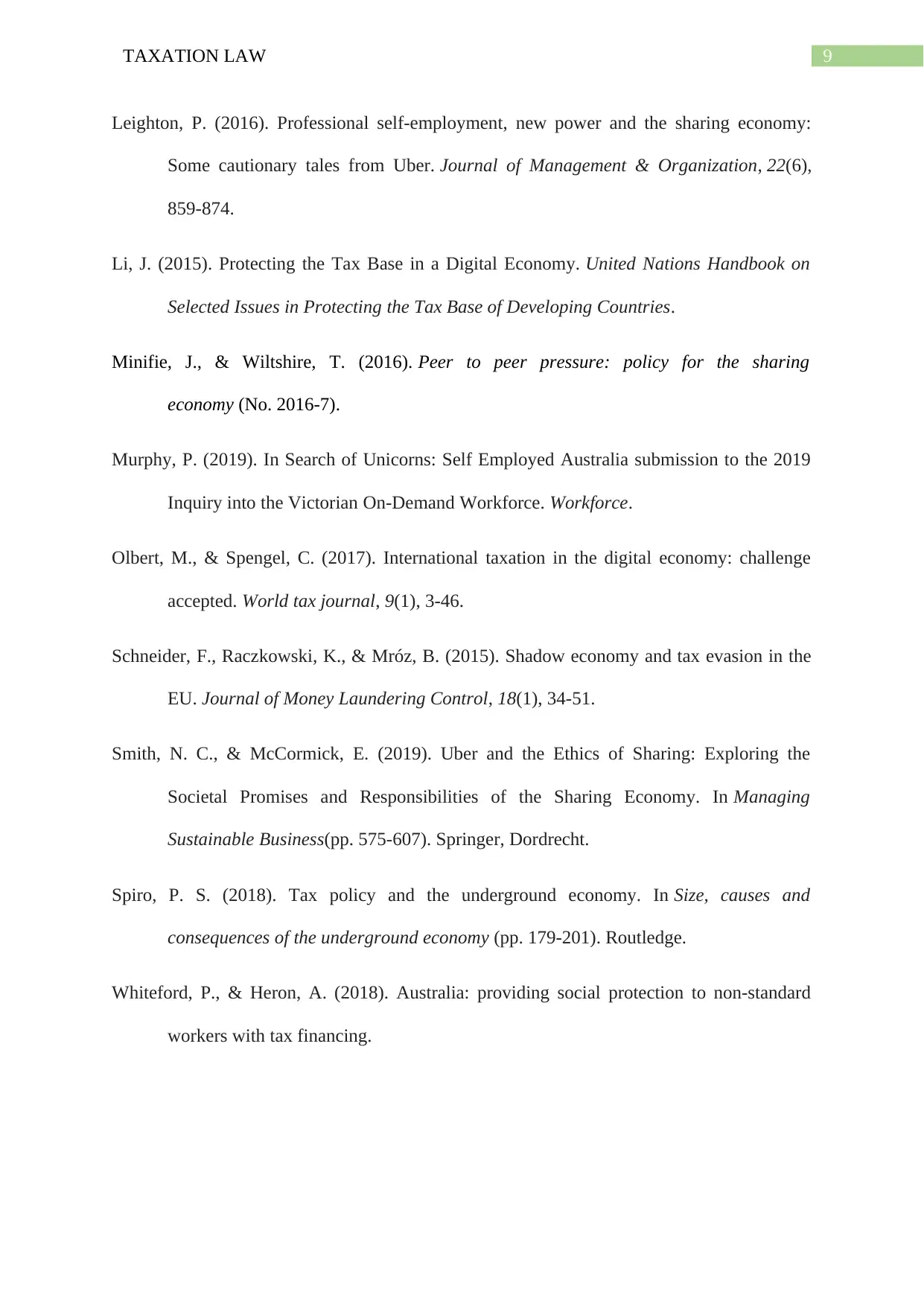
9TAXATION LAW
Leighton, P. (2016). Professional self-employment, new power and the sharing economy:
Some cautionary tales from Uber. Journal of Management & Organization, 22(6),
859-874.
Li, J. (2015). Protecting the Tax Base in a Digital Economy. United Nations Handbook on
Selected Issues in Protecting the Tax Base of Developing Countries.
Minifie, J., & Wiltshire, T. (2016). Peer to peer pressure: policy for the sharing
economy (No. 2016-7).
Murphy, P. (2019). In Search of Unicorns: Self Employed Australia submission to the 2019
Inquiry into the Victorian On-Demand Workforce. Workforce.
Olbert, M., & Spengel, C. (2017). International taxation in the digital economy: challenge
accepted. World tax journal, 9(1), 3-46.
Schneider, F., Raczkowski, K., & Mróz, B. (2015). Shadow economy and tax evasion in the
EU. Journal of Money Laundering Control, 18(1), 34-51.
Smith, N. C., & McCormick, E. (2019). Uber and the Ethics of Sharing: Exploring the
Societal Promises and Responsibilities of the Sharing Economy. In Managing
Sustainable Business(pp. 575-607). Springer, Dordrecht.
Spiro, P. S. (2018). Tax policy and the underground economy. In Size, causes and
consequences of the underground economy (pp. 179-201). Routledge.
Whiteford, P., & Heron, A. (2018). Australia: providing social protection to non-standard
workers with tax financing.
Leighton, P. (2016). Professional self-employment, new power and the sharing economy:
Some cautionary tales from Uber. Journal of Management & Organization, 22(6),
859-874.
Li, J. (2015). Protecting the Tax Base in a Digital Economy. United Nations Handbook on
Selected Issues in Protecting the Tax Base of Developing Countries.
Minifie, J., & Wiltshire, T. (2016). Peer to peer pressure: policy for the sharing
economy (No. 2016-7).
Murphy, P. (2019). In Search of Unicorns: Self Employed Australia submission to the 2019
Inquiry into the Victorian On-Demand Workforce. Workforce.
Olbert, M., & Spengel, C. (2017). International taxation in the digital economy: challenge
accepted. World tax journal, 9(1), 3-46.
Schneider, F., Raczkowski, K., & Mróz, B. (2015). Shadow economy and tax evasion in the
EU. Journal of Money Laundering Control, 18(1), 34-51.
Smith, N. C., & McCormick, E. (2019). Uber and the Ethics of Sharing: Exploring the
Societal Promises and Responsibilities of the Sharing Economy. In Managing
Sustainable Business(pp. 575-607). Springer, Dordrecht.
Spiro, P. S. (2018). Tax policy and the underground economy. In Size, causes and
consequences of the underground economy (pp. 179-201). Routledge.
Whiteford, P., & Heron, A. (2018). Australia: providing social protection to non-standard
workers with tax financing.
1 out of 10
Related Documents
Your All-in-One AI-Powered Toolkit for Academic Success.
+13062052269
info@desklib.com
Available 24*7 on WhatsApp / Email
![[object Object]](/_next/static/media/star-bottom.7253800d.svg)
Unlock your academic potential
Copyright © 2020–2026 A2Z Services. All Rights Reserved. Developed and managed by ZUCOL.





